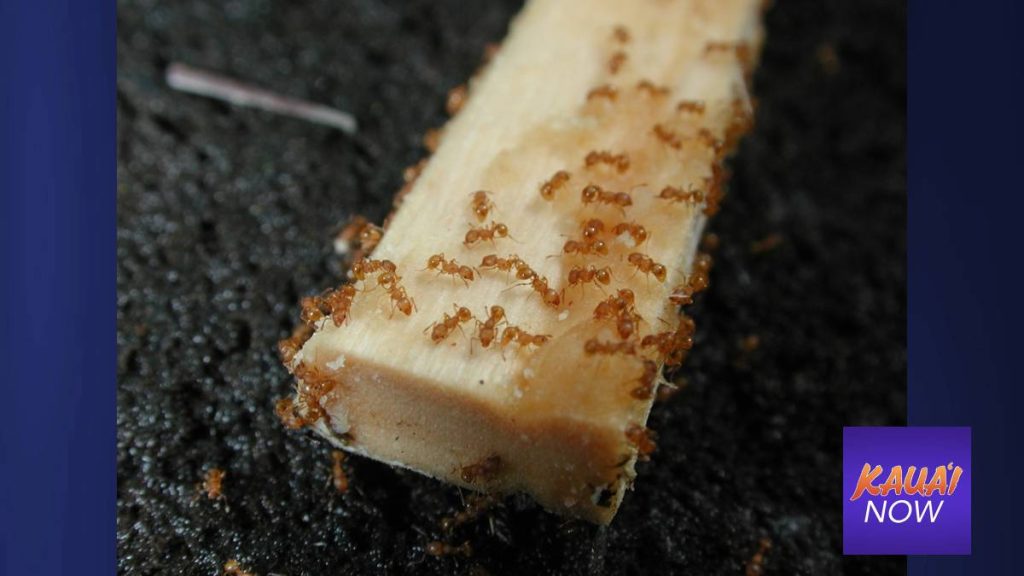October is ‘Stop the Ant Month’ in Hawaiʻi

October is “Stop the Ant Month” in Hawaiʻi and a multi-agency effort throughout the month will encourage residents to collect and submit ants from their properties to help detect and control the spread of invasive little fire ants and other harmful pest ants that may be new to the state.
Little fire ants are considered among the world’s worst invasive species. Little fire ants are tiny ants, measuring 1/16 of an inch long, and orange in color. Little fire ants move slowly and stings tend to occur when the ants fall from trees or vegetation onto people, or when infestations become so large that the ants move into yards, homes, and businesses.
Little fire ants can produce painful stings and large red welts or itchy rashes that last for weeks. Stings to pets’ eyes cause injuries that may result in blindness.
Hawaiʻi residents play a crucial role in protecting their communities because infestations that are found early enough can be eradicated. Each year, several new little fire ants infestations are detected by residents participating in this statewide program, each of which prevents millions of dollars in impacts and perpetual costs for entire communities. To date, no new ant species have been found, but the risk is high because ants hitchhike on goods and Hawai‘i imports a high volume of goods from around the world.
Residents may request a free ant-collection kit through the website: www.StopTheAnt.org, or can make their own using household supplies. Residents should collect ants from their properties by using a thin smear of peanut butter on the tips of several chopsticks and leaving the sticks around their property for about 30 minutes to attract any ants in the area. After a half-hour, sticks should be carefully collected and sealed in a zip-top bag and frozen overnight to kill any ants, then mailed or dropped off for identification at any of these locations:
- Oʻahu Invasive Species Committee 808-266-7994, 743 Ulukahiki Street, Kailua, HI 96734
- Maui/Lāna‘i Invasive Species Committee, 808-573-6472, PO Box 983, Makawao, HI 96768
- Kauaʻi Invasive Species Committee, 808-821-1490, 7370K Kuamoo Road, Kapaʻa, HI 96746
- Moloka‘i/Maui Invasive Species Committee, 808-553-4236, P.O. Box 220, Kualapuʻu, HI 96757
- Big Island Invasive Species Committee, 808-933-3346, 23 East Kawili Street, Hilo, HI 96720
- Hawai‘i Ant Lab in Hilo, 808-315-5656, C/O Hawai‘i Department of Agriculture, 16 E. Lanikaula Street, Hilo, HI 96720
- Hawai‘i Ant Lab in Kona, 808-209-9014, c/o CTAHR Extension Office, 79-7381 Old Mamalahoa Hwy, Kealakekua, HI 96750
Hawai‘i has no native ants and has prioritized the detection of new, harmful ant species, and the management of particularly harmful ant species such as little fire ants, which sting and can cause other harm.
Little fire ants are unique because they nest in vegetation and up in trees as well as in leaf litter, unlike the fire ants that have been in Hawai‘i since the 1800s, which form nests underground and are common in beach parks and sports fields. Originally from South America, little fire ants were first detected in the state on Hawaiʻi Island in 1999. By the time they were detected, the ants had already spread to more than 40 properties around the island and no pesticides or treatment protocol existed for controlling fire ants in trees.
The Hawaiʻi Ant Lab was subsequently established to research and develop methods for the eradication and control of little fire ants. Efforts on Hawaiʻi Island are currently focused on preventing the spread to neighboring islands and in exported goods, managing high-priority sites, and helping the public and communities manage infestations. The focus on all other islands is early detection and control or eradication wherever possible.





